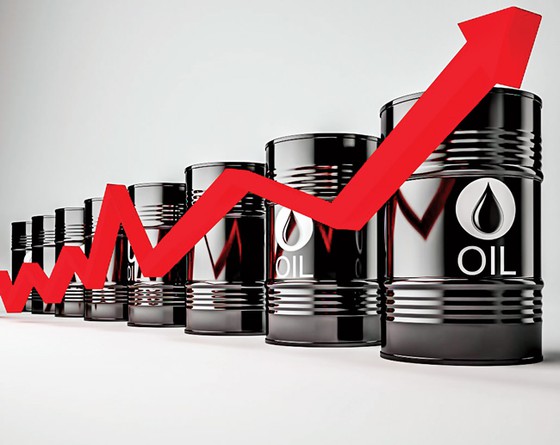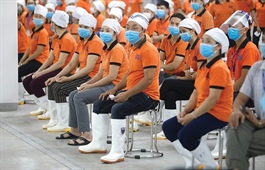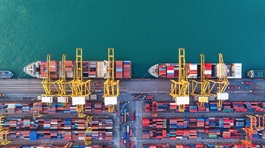Many factors behind rising inflation
Many factors behind rising inflation
The 2020 Consumer Price Index (CPI) in Vietnam was contained at 3.23%, but which will be difficult to maintain at a target of 4% in 2021. The reasons behind this lies in many complicating factors that can push the CPI up rather suddenly and unexpectedly.
Illustrative photo.
|
Inflation control in 2020
Looking back at inflation control in Vietnam at 3.23% in 2020, it is seen that there are both objective and subjective reasons that are running intertwined. Regarding objective reasons, the outbreak and spread of the Covid-19 pandemic on such a large scale caused the global economy to fall into a deep recession. According to the International Monetary Fund (IMF), the world economy in 2020 contracted by 4.4% due to countries implementing social distancing to prevent the spread, and the economy falling into crisis, with production and businesses stagnating, so the demand for oil mining and raw materials for production and business have also decreased. Even the price of oil sometimes drops way too low. In an economy with a wide berth towards integration and a very large import turnover like Vietnam, this is a factor that contributes to price increase and inflation.
In addition, in order to contain the pandemic and stimulate the economy, countries around the world have offered huge economic support packages from the government budget. Therefore, the value of major currencies and currencies in the region have declined. This is an opportunity for the Vietnamese dong to maintain value, even increase in value, which is an important basis for CPI to always show a low increase.
Regarding subjective reasons, for the first time in Vietnam, within a year the State Bank of Vietnam (SBV) reduced the operating interest rate three times. Accordingly, the operating interest rate has decreased from 1.5% to 2.0% per year; deposit interest rate ceiling has reduced from 0.6% to 1.0% per year; and the ceiling on lending interest rates for priority sectors reduced by 1.5% per year. The SBV adjustment to lower operating interest rates has supported liquidity for credit institutions, reducing borrowing costs for people and businesses in the current difficult phase of the Covid-19 pandemic.
This move has created favorable conditions for commercial banks to lower deposit rates and on that basis gradually lower lending rates, creating conditions for businesses to access financial sources for loans at lower interest rates. The extension and postponement of debt collection, temporarily not changing debt groups, implementing debt restructuring for enterprises, have all contributed to stabilizing capital and money markets.
Along with that, the Ministry of Finance also has packages to support businesses and the economy to recover and develop during and after the Covid-19 pandemic. The Ministry of Finance has requested the Government to exempt or reduce more than 20 types of fees and charges for businesses to reduce production costs, and in order to promptly release inventory and goods that cannot be exported, businesses have policies to promote and reduce sales prices, causing prices of many groups of goods to decrease. For the first time in many years, the electricity industry has twice reduced electricity prices for businesses and users, which also lowers CPI.
2021 forecast as difficult
In 2021, Vietnam's economy is forecast to recover and develop strongly, which will put great pressure on prices, interest rates, exchange rates, and inflation. First of all, due to disease prevention and control, the people and society awareness of pandemic prevention and control has increased. Vietnam has switched to a policy of strict border control, zoning out the pandemic at origin within appropriate range. The country's production showed strong signs of recovery in the fourth quarter of 2020, while the demand for raw materials and labor increased. People's income also increased, requiring goods to meet a variety of design and quality standards. Increased consumer demand is also a factor that can promote high inflation.
Recently, bank interest rates have been relatively low. When production recovers, the increased demand for credit capital will likely drive up interest rates and inflation. Moreover, in recent times due to low-interest rates, a large amount of money may have been diverted to the real estate sector, so despite the outbreak of the pandemic, prices in this segment of the market did not decrease, even increased a lot in many localities such as Hanoi and Ho Chi Minh City.
In particular, a large amount of money is flowing strongly into the stock market. If at the end of the first quarter of 2020, the VN-Index was about 660 points, and by the beginning of the first quarter of 2021, this index had increased to 1,130 points. This could be a sign of a very good economic recovery and investors' bright expectations for the recovery and growth of the Vietnamese economy. However, it is also important to closely monitor the volatility in both markets to avoid situations that could adversely affect the monetary and financial markets and inflation. In addition, the possibility that FDI capital will increase in 2021 will also be a factor that can push up inflation.
It is forecast that in 2021 the pandemic will be even more complicated and unpredictable, while the world economy will recover slowly, and Vietnam's economy will grow 6.0% to 6.7%, with inflation likely to be around 3.3%. If the pandemic is controlled sooner, the world economy will recover well. Vietnam's economy can make good use of opportunities, seize and adapt to free trade agreements and major changes in the world economy, and grow by 6.8% to 7.4%, with an inflation rate of probably around 3.8%.
The National Assembly target of keeping CPI growth rate at below 4% in 2021 seems like a difficult goal. To achieve this, the Government needs to step up all its prevention measures to contain the Covid-19 pandemic from spreading and destabilizing production, markets, and commodity prices across the country.

























